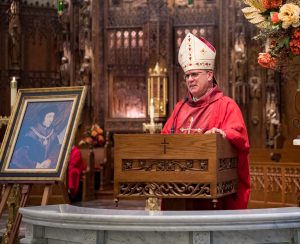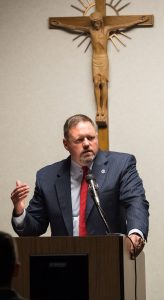October 12, 2017 // Diocese
Red Mass invokes gifts of the Holy Spirit
The Red Mass, a Mass celebrated annually in the Catholic Church for judges, lawyers, law school professors, law students and government officials, took place Tuesday, Oct. 3, at the Cathedral of the Immaculate Conception in downtown Fort Wayne. The Mass, celebrated by Bishop Kevin C. Rhoades and attended by scores of legal professionals, requested guidance from the Holy Spirit for all those seeking justice and offered the opportunity to reflect on the God-given power and responsibility of those in that profession.

Bishop Kevin C. Rhoades celebrates a Mass for those in the legal profession Oct. 3 at the Cathedral of the Immaculate Conception, Fort Wayne. — Photo by John Martin
Originating in Europe during the Middle Ages, the Red Mass gained its name from the red vestments traditionally worn as a symbol of the tongues of fire, or the Holy Spirit, that descended on the apostles at Pentecost. Its focus is on the leadership roles of those present and the gifts of the Holy Spirit, i.e., wisdom, understanding, counsel, fortitude, knowledge, piety and fear of the Lord, which are customarily invoked upon them.
Bishop Rhoades spoke, during his homily, about the recent questioning of Amy Barrett Coney by the Senate Judiciary Committee, saying, “At this Red Mass, we are asking the Holy Spirit to bestow His gifts upon you who serve as lawyers, judges, law professors, law students and civic officials. If our prayer is answered, you know what is going to happen?” He answered that question by saying, “Dogma will live loudly within you! Your faith … will be real and authentic, inspiring you to serve the common good, justice, human life and dignity and peace. It will inspire you to be generous, to care for the weak and the poor and to protect the vulnerable.”
He also reminded his audience of the great saint and jurist St. Thomas More, who refused in conscience to take the Oath of Supremacy, which required recognizing the king of England as head of the church. “Thomas More had a well-formed Christian conscience … he would not take an oath in violation of God’s law, even though it meant imprisonment and death. He died, as he said at the scaffold, as ‘the king’s loyal servant, but God’s servant first.’ He not only had the Holy Spirit’s gift of wisdom, but also the Holy Spirit’s gift of fortitude or courage. Because of this, I would say that dogma really lived loudly within St. Thomas More, so loudly that he became a martyr. When faith is alive in our hearts, when dogma lives loudly within us, when we are open to the Holy Spirit’s gifts, we possess the wisdom and courage to act morally and truthfully according to a well-formed conscience.”
Bishop Rhoades referred once again to Barrett. “In her wonderful speech to the graduates of the Notre Dame School of Law in 2006, Professor Barrett expressed her hope that they would be a different kind of lawyer in the Notre Dame tradition. She explained that this means that they would see their legal career as a means to an end, that being the building of the kingdom of God. It is astonishing to me that some critics found these words objectionable,” he said. Professor Barrett was encouraging the graduates to live their lives according to their ultimate end by reminding them that their fundamental purpose in life is to know, love and serve God.

Speaking to attendees on the subject of reproductive rights, Attorney Robert Muise of the American Freedom Law Center addresses an audience of legal professionals at the Archbishop Noll Center in Fort Wayne following the Red Mass.
Following Mass, attendees enjoyed dinner at the Archbishop Noll Catholic Center, where attorney Robert Muise, co-founder of the American Freedom Law Center in Ann Arbor, Michigan, was the keynote speaker. Muise, an expert in constitutional law dedicated to defending religious liberty, the freedom of speech and the right to life in state and federal trial and appellate courts across the country, brought his considerable expertise to bear on his remarks.
Muise’s address, “Reproductive Rights, a Pro-Life Perspective,” followed closely on Bishop Rhoades’ observations at Mass about rights and responsibilities. Muise outlined the genesis of the “right” to abortion as it evolved in four case studies, Griswold v. Connecticut (1965), Eisenstadt v. Baird (1972), Roe v. Wade (1973) and Doe v. Bolton (1973).
In the Griswold case, the Supreme Court of the United States ruled that the state of Texas’ ban on contraception violated a married couple’s right to marital privacy. In Eisenstadt v. Baird, the court further ruled that unmarried couples may also possess contraception. In Roe v. Wade, the court famously affirmed the legality of a woman’s right to have an abortion if contraception failed. In order to preserve the health of the mother, abortion was allowed during the entire term of her pregnancy, leaving states only the right to set some conditions on second- and third-trimester abortions. The court also declared that a fetus is not a “person” and therefore not afforded the protection of the 14th Amendment of the U. S. Constitution. In a companion case issued the same year, the Supreme Court ruled in Doe v. Bolton that all factors — physical, emotional, psychological, familial and the woman’s age – may be considered in determining whether an abortion is necessary for the mother’s “health.”
Muise referred to Pope Paul VI’s prophesies in his encyclical “Humanae Vitae,” issued in 1968. The pope predicted that the widespread use of contraception would lead to conjugal infidelity and the lowering of morality, especially sexual morality. And the increase in divorces, abortion, out-of-wedlock pregnancies and venereal diseases seem to bear out his words. He predicted that men would lose respect for women and see them only as objects of pleasure. He also said that widespread acceptance of contraception would place dangerous power in the hands of public authorities and family-planning programs in many Third World countries is testimony to that. Finally, Pope Paul VI believed that contraception would lead people to believe they had total control over their own bodies, which has led to the production of test-tube babies, sterilization and euthanasia.
The best news. Delivered to your inbox.
Subscribe to our mailing list today.






